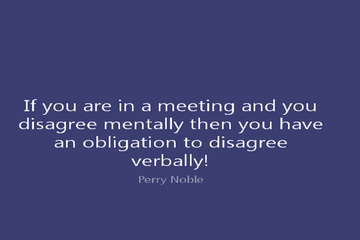“I Disagree, Boss!”: How To Say It Right
After every meeting with her boss, Mohita gets upset as she was not always in agreement with the ‘facts’ presented by her boss. In her last job when she tried speaking, it made her life hell and now she dreads the idea of that episode being repeated; hence, she thinks keeping mum is the best option. Have you ever felt like Mohita does?
Let’s play a game; switch positions with your boss; now, recollect the instance when you felt your boss was wrong, or she missed an important point. Now you are at her position; would you know you are wrong unless someone pointed it out?
Be it your boss, your colleague, your subordinate or even you, it’s human nature that no one likes people countering them. But by letting them know your point of view in the right manner you could:
-
Gain confidence to speak publically;
-
Be noticed for raising valid and important points;
-
Assure your supervisor and peers that you are attentive and listening;
-
Build trust with your team and supervisor.
Walter Lippmann said, "Where all think alike, no one thinks very much". So, it’s good to speak (even if it counters your boss), but saying things in the right manner is crucial. Here are quick tips to achieve that:
Set the Tone Right
The famous poet Rumi said, “Raise your words, not your voice, it is rain that grows flowers, not thunder!” We all are humans prone to error, so blasting or shouting may not help. Set your tone right. You may start with “I like to differ”, or “I thought if we could also look at the other perspective which is…” or even “I was thinking out loud, so could we follow another approach…”. Keep yourself calm and polite.
Support Arguments with Facts
Rohan, who was unhappy with his appraisal rating, collected data of all his achievements in the last year in a power-point presentation, scheduled a meeting with his boss and then presented why he disagrees with his current appraisal rating. His boss gladly accepted his milestones and revised his ratings. So once you have facts and data to support your argument, it gets easy to present your point.
Be Tactful
Tact is beautifully defined by Benjamin Franklin: "remembering not only to say the right thing in the right place but far more difficult still, to leave unsaid the wrong thing at the tempting moment. So if you are about to disagree with your boss, executing it in an apologetic manner may not portray you as serious enough, and if you are too arrogant it could backfire. So you need to strike a balance between the two; be firm, yet polite.
Step Back
The war cannot be finished in a day; so if you think the argument is heading to disaster, step back and pause. There is no harm in saying “I feel we are moving away from the discussion, let's pause, and we may again resume our discussion in the upcoming meeting”. Clifford Adams said, Silence is never more golden than when a quarrel is brewing.” So, with a clear and cool head, think about the matter, collect facts and start the discussion afresh.
Avoid Getting Personal
Not all arguments can be won; so in case “this was not your lucky day”, accept it! Do not get personal and avoid making nasty comments after. If you accept “disagreement” graciously, she may consider your point in the future. So building trust is important!
Remember, It’s your right to disagree on certain matters as you and your boss are two different individuals; however, what’s important is to churn and make it “productive disagreement” that could help the team and the company, besides helping you as an individual, to achieve the common goal.
















